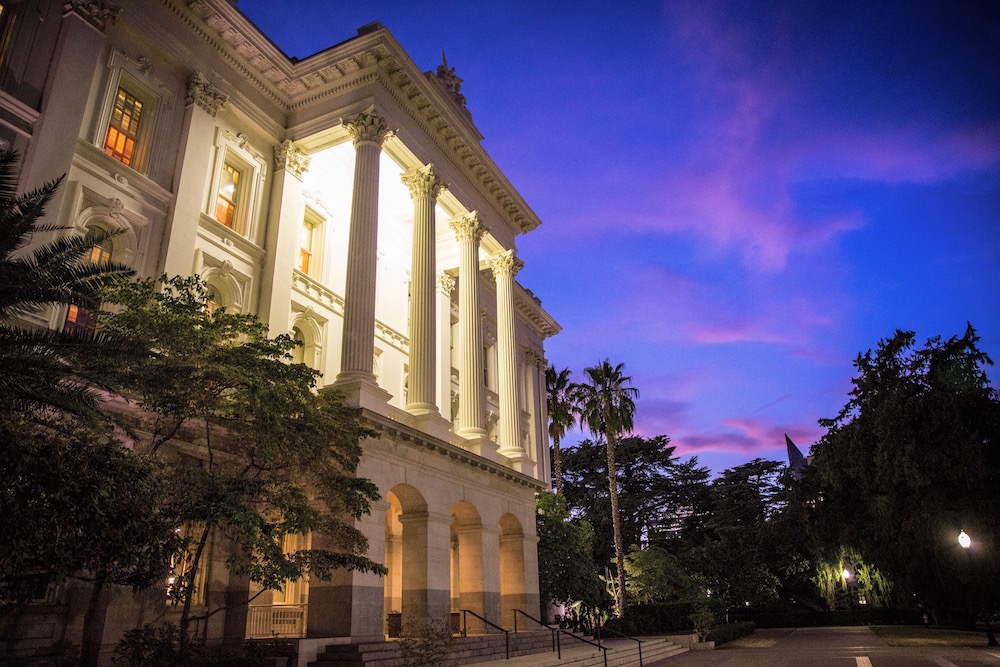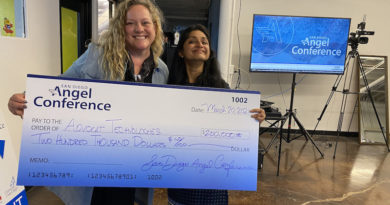Daily Business Report-July 2, 2018
State Capitol (Photo by Jeff Turner, courtesy of CALmatters)
Special interests win: Lawmakers cut last-minute
deals to pull initiatives off your ballot
By Laurel Rosenhall | CALmatters
In a frenzy of Capitol wheeling and dealing this week, California legislators worked to pass new laws that will shorten your November ballot—by placating moneyed industries.
An optimist might cheer the fact that lawmakers were doing their jobs instead of punting to the voters to decide complicated policy questions via a slew of initiatives. Others might label it legal extortion.
Whatever you call it, in one day on Thursday, proponents of three initiatives abruptly pulled their measures off the ballot. Gov. Jerry Brown signed two hastily-written laws, and legislators promised to keep negotiating toward a deal to enact a third.
The soda industry won a new law that places a 13-year ban on new soda taxes—a concession it extracted after qualifying a ballot initiative that would have raised the threshold for passing all local taxes.
Tech companies breathed a sigh of relief with passage of a new law that expands some internet privacy safeguardsbut allows them to keep lobbying to change it—because they feared voters would approve a qualified ballot initiative that would have gone further, and been harder to undo in the future.
Lead paint companies, accepting a promise from legislative leaders to continue negotiations, withdrew their initiative designed to get them out of hundreds of millions of dollars in liability that courts have slapped on them for knowingly selling a toxic product.
It was an unusual burst of activity, not only because so much happened so quickly, but also because lawmakers resolved issues they had previously shown little inclination to tackle.
And it only went down because outside interests—corporate giants and wealthy individuals, many of whom are campaign donors—used the threat of a ballot initiative to pressure lawmakers: Cut a deal you don’t like now, or face something you like even less on the ballot.
The maneuvering in advance of Thursday’s deadline to decide what goes on the November ballot was triggered by changes to the law that give initiative proponents more time to yank their measures off the ballot. The reforms, enacted four years ago but just beginning to be used in earnest, were intended to eliminate some costly ballot box fights and shift complex policy negotiations to the Legislature. That, in some ways, was accomplished. But the outcome this week reveals that the new process allows anyone with enough money to qualify a measure for the ballot to use the threat of direct democracy as leverage to pressure the Legislature.
It’s “another example of how special interests hijack our political system,” Democratic state Sen. Ricardo Lara decried on the Senate floor as he prepared to vote for the ban on soda taxes.
Democratic Assemblyman Jim Wood of Healdsburg called it “extortion.”
Legislators hadn’t considered bills to prohibit cities from passing new soda taxes until the soda industry spent nearly $6 million to put a measure on the ballot that would have made it harder for cities to pass all kinds of tax increases. The measure, supported by a coalition of business groups, would have required any new tax increases be approved by two-thirds of voters, instead of a simple majority. Cities—and their unionized workers—hated it, since many tax increases are used to pay for police, firefighters and other local services. So the unions and soda companies began negotiating, ultimately crafting a deal that became public just four days before it was signed into law. The compromise Brown signed bans local governments from passing taxes on soda and other groceries until 2031, but maintains the lower simple-majority threshold for voters to approve new taxes.
Republicans called it a “backroom deal” to diminish local control and many voted against it. Public health advocates blasted it for different reasons, saying the ban removed their ability to reduce the health impacts of soda by taxing it, prompting several Democrats to vote against it too.
Dynamics with the internet privacy measure were a little different. Legislators had considered a privacy bill last year but ultimately killed it under pressure from the tech lobby. Then this year a San Francisco real estate developer poured $3 million into putting a similar measure on the ballot after he became outraged by how much data companies collect as people move through the web. Tech companies put $1 million into fighting it.
Behind the scenes, legislators began negotiating with the initiative proponent, Alastair Mactaggart. They agreed on a bill that achieved many of the same aims as his ballot measure—allowing Californians to find out what information is collected about them and where the information is sold, and opt out of having their data sold—but gives people fewer opportunities to sue when companies don’t follow the law. The bill also allows companies to charge users more, within certain limits, if they opt out of having their data sold.
Tech companies still don’t like it, but their lobbyists said they would prefer the bill over the ballot measure. Laws passed in the Legislature can be changed more easily than laws passed by voters, and lawmakers agreed to delay implementation of the privacy law for a year so it can be changed. That means tech lobbyists are likely to push hard next year to alter it. The American Civil Liberties Union said it will also push for changes, but likely in the other direction—for more privacy protections. Nonetheless, the bill earned bipartisan support, with many lawmakers praising Mactaggart for pressuring them to take action.
“We know that privacy is an important issue, and yet we chose to ignore it because of the controversy involved,” said Republican Sen. Joel Anderson of Alpine.
Assembly Speaker Anthony Rendon said the initiative process “is not perfect or ideal.” “But,” he added, “it can spur the Legislature to act on issues that challenge us.”
The lead paint deal was the biggest surprise of the three. Paint companies put $6 million into a campaign for a ballot measure to eliminate their liability for cleaning up deteriorating paint in old houses—shifting it to taxpayers instead. In recent months, lawmakers excoriated the companies in public hearings, called the initiative a cynical ploy and crafted bills to hold the paint manufacturers liable.
Lawmakers agreed to set those bills aside in exchange for the paint companies dropping their initiative. Legislative leaders announced late Thursday that the parties “have agreed to work collaboratively” and the companies promptly yanked their ballot measure.
Voters will still face a dozen ballot measures in November: Should we cap prices at dialysis clinics? Repeal limits on rent control? Carve California into three states? Give chickens and other farm animals more room to roam?
But the news that three fights moved off the ballot and into the Capitol marked success for those who backed the law to change the initiative system.
“Initiatives are a very important outlet but they are not the product of compromise—they are written by one side or the other,” said Sacramento Mayor Darrell Steinberg, who wrote the law changing the initiative process when he was the leader of the state senate. “The legislative process requires compromise.”
CALmatters reporter Robbie Short contributed to this report. CALmatters.orgis a nonprofit, nonpartisan media venture explaining California policies and politics.
__________________
San Diego County property values
top $543 billion in 2018
The value of all taxable property in San Diego County rose to $543.6 billion in 2018, an increase of 6.11 percent or $31.3 billion, over the 2017 roll, according to Assessor Ernest Dronenburg Jr.
The net assessed value after the deduction of property tax exemptions for homeowners, disabled veterans and charitable organizations is $521.8 billion. Based on Proposition 13’s statutory 1 percent tax rate, this will produce approximately $5.21 billion in tax revenue to fund schools, law enforcement, parks and other public services.
“This is the fourth consecutive year the assessment roll has increased in excess of 5 percent, thanks to the continued growth of the housing market and the economy as a whole.” Dronenburg said. “In addition to the strong real estate market, the assessed business property value increased by 5 percent, to just over $18.2 billion, setting a new record for San Diego County. While housing affordability is a challenge in San Diego County, 83 percent of property and homeowners will only see a 2 percent increase in their assessed value due to the protections offered by Proposition 13.”
__________________

San Diego Diplomacy Council
launches Youth Sports Diplomacy program
sdnews.com
The San Diego Diplomacy Council is launching its first Youth Sports Diplomacy Program. The council will take 25 female volleyball players and coaches from the Exodus Social Justice Volleyball Club, an organization founded on offering quality coaching to underprivileged and unsheltered youth, to Vietnam and Laos this month for a sports and cultural exchange program, Adaptive Sports for Social Change. This program is organized by the San Diego Diplomacy Council in partnership with the National Ability Center and is funded through an International Sports Programming Initiative cooperative agreement through the U.S. Department of State’s Bureau of Education and Cultural Affairs’ Sports Diplomacy division.
Read more…
__________________
State budget contains $50,000 for
city attorney to train law agencies
The state budget signed by Gov. Jerry Brown last week appropriates $50,000 for the San Diego City Attorney’s Office to train law enforcement agencies throughout California on the use of gun violence restraining orders.
The appropriation was included at the request of Assemblyman Phil Ting, the chair of the Assembly Budget Committee.
Since December, the City Attorney’s Office has obtained 39 gun violence restraining orders against gun owners who are a threat to themselves or others. The cases often involve underlying issues, including addiction, dementia, and other mental health problems, coupled with specific threats of violence or threatening behavior.
__________________
California mortgage lending by
non-banks fell sharply in 2017
Non-bank mortgage lenders in California reported significantly less activity in 2017, with both the number of loans and combined principal amount declining by nearly 30 percent from 2016, according to a report released by the Department of Business Oversight (DBO).
“It would be unwise to draw any conclusions about California’s housing market from this data, because the number of licensees that filed their required reports declined by eight percent from 2016,” said DBO Commissioner Jan Lynn Owen. “That’s disturbing, and we will take appropriate action under the law to deal with licensees that did not file their reports. The data is important for us, the public and policymakers.”
Non-bank lenders licensed by the DBO under the California Residential Mortgage Lending Act reported originating 431,052 loans in 2017, down 28.4 percent from 602,430 in 2016. The combined principal amount of 2017 loans totaled $150.7 billion, a 27.3 percent decrease from $207.4 billion in 2016.
__________________
Vista shopping center listed by
Institutional Property Advisors
Institutional Property Advisors (IPA), a division of Marcus & Millichap, has been retained as exclusive adviser for the sale of Pavilion, a 136,775-square-foot shopping center in Vista. The price is $29,867,095.
Built in 1989 on nearly 11 acres and completely refurbished in 2017, the center is located close to California State Route 78 in Vista near Mira Costa College. Pavilion’s major tenants include Altitude Trampoline Park, North Park Produce, the Indian Store, David’s Bridal, Luv 2 Play, Hardcore Fitness and Dunn-Edwards Paints. Property improvements include a new parking lot, roof, facade and monument signage.
__________________
Cal State San Marcos receives $1 million grant
Cal State San Marcos is among 57 colleges and universities selected for the Howard Hughes Medical Institute Inclusive Excellence Initiative, which provides $1 million in grant support over five years for each institution.
HHMI announced that Cal State was among 33 colleges and universities joining 24 institutions selected in 2017 for the Inclusive Excellence Initiative, which aims to catalyze schools’ efforts to engage all students in science regardless of background. That includes underrepresented ethnic minorities, first-generation college students and working adults with families.
__________________
Thermo Fisher offers DNA analysis
to aid U.S. border family reunions
Carlsbad biotechnology company Thermo Fisher Scientific is planning to donate $1 million worth of rapid DNA analysers and related technology to help reunite children separated from their parents at the U.S.-Mexico border.
The company claims that its “breakthrough technology” takes just 90 minutes to get a result from a sample, ensuring fast, easy and accurate DNA matching.
Thermo Fisher is offering its donation in response to widespread calls for accredited technology solutions to help with the current separation crisis. The company’s RapidHIT system can be set up at locations within 24 hours. It enables easy sampling as the self-contained collection kits only require a cheek swab. Other features include the rapid sample processing times and improved privacy and security.
__________________
Padres Pedal the Cause to fund new research
Using the $2.4 million raised in 2017, Padres Pedal the Cause announced the funding of new cancer research projects from collaborative teams at UC San Diego Health, Salk Institute, Rady Children’s Hospital, and Sanford Burnham Prebys Medical Discovery Institute. Now in its sixth year, Padres Pedal has raised more than $7.1 million in San Diego to fund projects that may enable larger grant funding, and ultimately, lead to a cure for cancer.
__________________
FDA approves ACADIA Pharmaceuticals
new dosing formulation
ACADIA Pharmaceuticals Inc. announced FDA approval of a new capsule dose formulation and a new tablet strength of NUPLAZID (pimavanserin) to help in the treatment of patients living with hallucinations and delusions associated with Parkinson’s disease psychosis.
The FDA approval of a 34 mg NUPLAZID capsule formulation will provide patients with the recommended 34 mg once daily dose in a single, small capsule, reducing patient pill burden versus the current administration of two 17 mg tablets. In addition, the FDA approval of a 10 mg tablet provides an optimized lower dosage strength in those patients who are concomitantly receiving strong cytochrome 3A4 inhibitors which can inhibit the metabolism of NUPLAZID.
__________________
UC San Diego and Spin showcase
strong bikeshare program results
The University of California San Diego and Spin, the dockless personal mobility company, are announcing the results of a bikeshare partnership pilot program which was created to provide more than 36,000 students, faculty and staff with an affordable, equitable and eco-friendly way to get around campus. The pilot, which launched in December 2017, is part of a university-wide initiative to become carbon-neutral by 2025.
Since the partnership pilot launched, the campus community has taken more than 75,000 rides for more than 12,800 miles, equivalent to roughly 14,100 pounds of CO2 saved had these trips been instead taken by car. Bike usage has been tracked to determine high-demand and preferred parking areas to identify which parts of campus benefit most from the service. Usage data is also being used to modernize bike parking design to accommodate personally owned and shared bikes.



